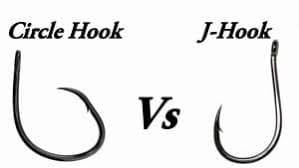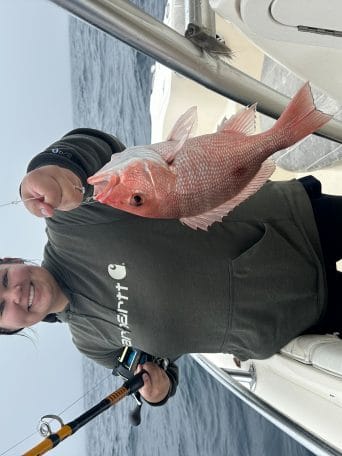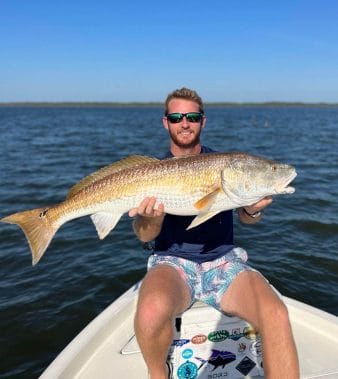Circle Hooks and J Hooks: The Differences

Circle hooks and J hooks are two of the most common types of fishing hooks used by anglers. Both hooks have their advantages and disadvantages and can be used in different situations depending on the type of fish being targeted.
Circle hooks are designed to be more efficient at hooking a fish than a traditional J hook. This is due to the shape of the hook, which is designed to catch the fish in the corner of the mouth, rather than the traditional J hook which can catch the fish in the throat or gut. This means that circle hooks are less likely to cause injury to the fish, making them a more humane option for catch and release fishing. Additionally, circle hooks are less likely to be swallowed by the fish, which can cause it to become hooked in the stomach or intestine.
The biggest advantage of using a circle hook is that it is more effective at catching fish than a J hook. This is due to the shape of the hook, which is designed to set in the corner of the fish’s mouth. This gives the angler more control over the fish and makes it easier to bring it to the boat. Additionally, the shape of the hook allows it to be used with a variety of baits, including live bait, cut bait, and artificial lures.
The biggest disadvantage of using a circle hook is that it is not as effective at catching large fish as a J hook. This is because the shape of the hook makes it more difficult to penetrate the thicker skin of larger fish. Additionally, the shape of the hook can make it difficult to set the hook in the corner of the mouth of a large fish, meaning that the angler may have to use a different technique to set the hook.
In general, J hooks are a better choice for anglers targeting large fish, while circle hooks are better suited for smaller fish. J hooks are more effective at penetrating the thick skin of larger fish, and are also better suited for use with heavier lines and larger baits. Circle hooks, on the other hand, are more effective at catching smaller fish and can be used with lighter lines and smaller baits.
Circle Hooks and Their Advantages

Circle hook fishing is a popular and effective method of catching reef fish, and has become increasingly popular in recent years. Circle hooks are designed to catch fish by hooking into the corner of the fish’s mouth, as opposed to many other types of hooks which are designed to hook into the side or top of the fish’s mouth. This makes circle hooks a much more humane and sustainable method of fishing, as the fish are less likely to be injured, and the hooks are more likely to be released if the fish is not kept.
Circle hooks are designed to be used with a bait, such as a live baitfish, or a strip of squid or cut bait. The bait is placed on the hook, and then cast out into the water. The fish will take the bait and swallow it, at which point the hook will catch in the corner of the fish’s mouth. This type of hook is also designed to be more resistant to snagging on rocks or other debris, making it a more efficient and effective method of fishing.
Circle hooks are a great choice for catching reef fish, as they are designed to be used in areas with a lot of structure and debris. This makes them ideal for targeting fish in areas where other types of hooks may not be as effective.
The hooks are also designed to be more resistant to corrosion, which makes them a great choice for fishing in saltwater.Overall, circle hooks are a great choice for targeting reef fish, and are becoming increasingly popular among anglers. They are designed to be more humane and sustainable, and are more resistant to snagging and corrosion. They are also great for targeting fish in areas with a lot of structure and debris, making them a great choice for anglers looking to target reef fish.
Fishing over a reef in Florida can be a great way to catch a variety of fish, but using a j-hook while fishing over a reef is illegal. The Florida Fish and Wildlife Conservation Commission (FWC) prohibits the use of j-hooks while fishing over a reef because they can damage the fragile coral and other marine life.
Are J Hooks Illegal?

J-hooks are a type of fishing hook that is shaped like a “J” and is often used by anglers to catch larger fish. Unfortunately, the sharp points of the hook can easily snag and damage the coral and other fragile organisms that live on the reef. This can have a devastating effect on the reef ecosystem and can lead to the death of many species of fish and other marine life.
The FWC has implemented regulations that prohibit the use of j-hooks while fishing over a reef in Florida. Anglers are encouraged to use circle hooks instead, which are designed to be less damaging to the reef and its inhabitants. Circle hooks have a rounded shape and are designed to catch fish without snagging or damaging the coral.
In addition to using circle hooks instead of j-hooks, anglers should also take care to avoid damaging the reef while fishing. This includes avoiding contact with the reef, using lures instead of live bait, and releasing any fish that are caught without removing them from the water. By following these regulations, anglers can help to protect the fragile reef ecosystem and ensure that future generations of Floridians can continue to enjoy the beauty and bounty of the ocean.
Ultimately, the choice between circle hooks and J hooks comes down to the type of fish being targeted and the angler’s personal preference. Both types of hooks have their advantages and disadvantages, and anglers should experiment with both to find which works best for their particular fishing situation, within local regulations.
At Southern Country Charters, we work diligently to provide a safe, responsible environment to all of our customers, as well as an education on fishing techniques and regulations. All of our license captains are informed of updated regulations and can answer any questions that you have about fishing responsibly in Florida. So call Southern Country Charters at 850-739-3175 or click the booking link above to book an inshore or offshore trip and come explore our fishery, have fun, and catch fish!

